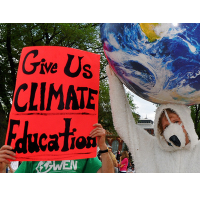California Sixth–Grade Science Books on the Fence over Climate Change
 (photo: MV Jantzen, Creative Commons)
(photo: MV Jantzen, Creative Commons)
California could reasonably be considered one of the more enlightened states when it comes to dealing with matters of science, like climate change. A recent survey (pdf) found that 62% of Californians believe the effects of global warming have started and 24% say it’s on the way.
While climate scientists consistently poll around 97% when asked if climate change is for real, the issue is still politically charged. Republicans still aren’t buying it. Only 37% in California say it’s happening.
Unfortunately, the information that ends up in middle-school text books is not immune from the political controversy. A new study from researchers at Southern Methodist University (SMU) in Texas and Stanford University found that four science textbooks used in California, from major publishers, framed the issue as being uncertain in the scientific community.
The researchers did linguistic analyses of the books and found that 279 clauses containing 2,770 words discussed global warming. The books communicated that there is a chance the world was warming, humans may or may not have something to do with that and it was uncertain whether anything should or could be done about it.
“Climate skeptics and climate deniers are given equal time and treated with equal weight as scientists and scientific facts—even though scientists who refute global warming total a miniscule number,” co-author Diego Román, an assistant professor in the Department of Teaching and Learning at SMU, said about the study.
The textbooks presented the science as being contested, rather than the politics.
The findings were presented last month at the 11th Conference of the European Science Education Research Association (ESERA) in Helsinki, Finland, and published in the journal Environmental Education Research.
While the researchers noted the value of including weasel words like could, might or may to describe the uncertainty of scientific information, they prefer their use in describing precisely what is uncertain. Instead, they found examples in textbooks like this:
“Global warming could have some positive effects. Farmers in some areas that are now cool could plant two crops a year instead of one. Places that are too cold for farming today could become farmland. However, many effects of global warming are likely to be less positive. Higher temperatures would cause water to evaporate from exposed soil, such as plowed farmland. Dry soil blows away easily. Thus, some fertile fields might become ‘dust bowls.’”
Nice balance, but an inappropriate representation of the science.
The textbooks used verbs like “think” (it was the most popular) and “believe” when describing scientists’ information, as if it were their opinions. But they rarely used words like “evidence” and “data,” except to cast doubt on the science. “Find,” “determine,” “measure” and “obtain” were also rarely used.
The books also use language to disconnect students from climate change. It presents the human contribution as someone else burning coal or cutting down rain forests, rather than show how their day-to-day lives inadvertently contribute to the problem.
That may not prepare students for the real world of global warming, but they will be ready for the fair and balanced truthiness of Fox News.
–Ken Broder
To Learn More:
California 6th Grade Science Books: Climate Change a Matter of Opinion Not Scientific Fact (Southern Methodist University)
Climate Change in the Californian Mind (Yale Project on Climate Change Communication) (pdf)
Californians & the Environment (by Mark Baldassare, Dean Bonner, David Kordus and Lunna Lopes, Public Policy Institute of California) (pdf)
38% of Californians, Mostly Republicans, Deny Climate Change Affects the State (by Ken Broder, AllGov California)
Textbooks of Doubt: Using Systemic Functional Analysis to Explore the Framing of Climate Change in Middle-School Science Textbooks (by Diego Romána & K.C. Busch, Environmental Education Research)
- Top Stories
- Controversies
- Where is the Money Going?
- California and the Nation
- Appointments and Resignations
- Unusual News
- Latest News
- California Forbids U.S. Immigration Agents from Pretending to be Police
- California Lawmakers Urged to Strip “Self-Dealing” Tax Board of Its Duties
- Big Oil’s Grip on California
- Santa Cruz Police See Homeland Security Betrayal in Use of Gang Roundup as Cover for Immigration Raid
- Oil Companies Face Deadline to Stop Polluting California Groundwater





